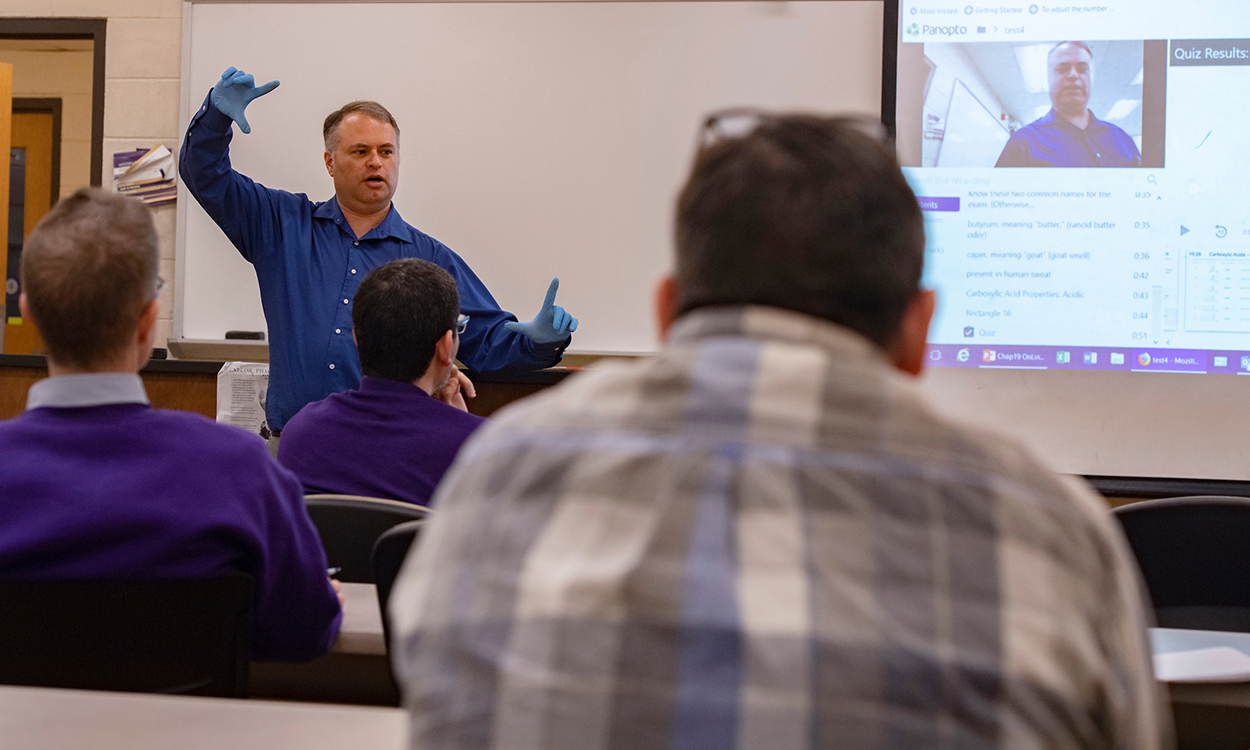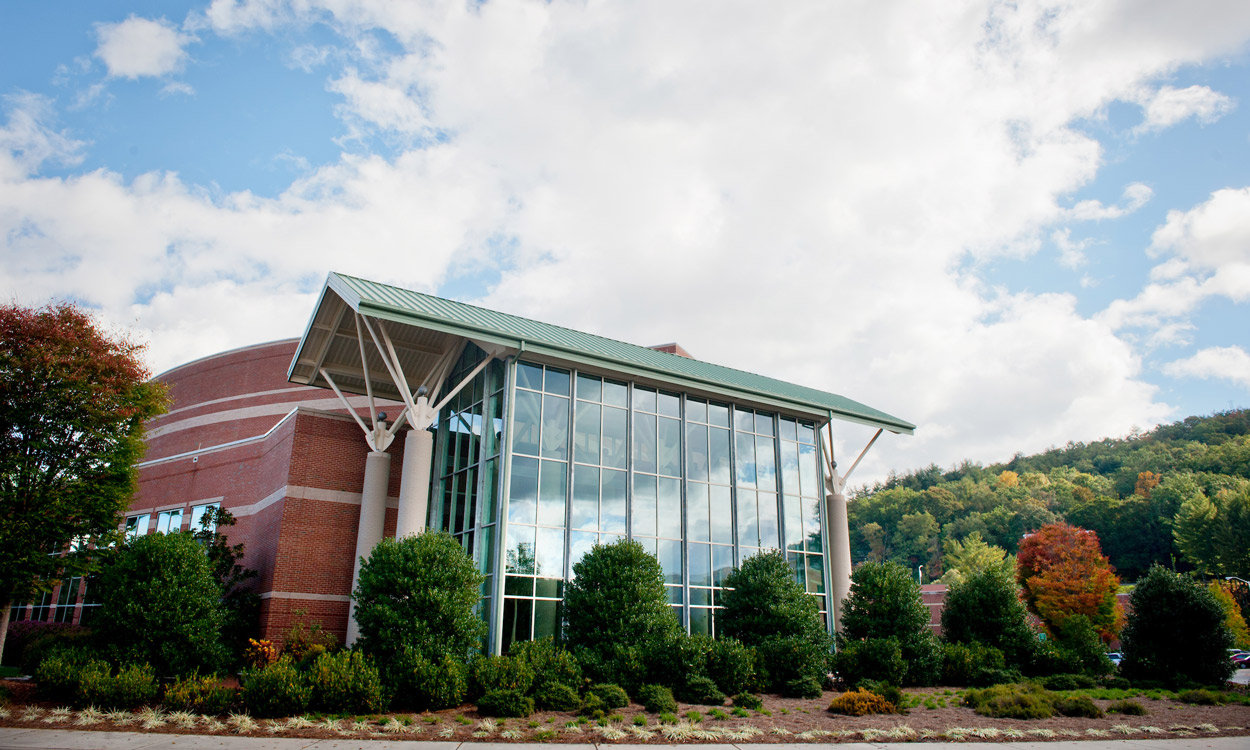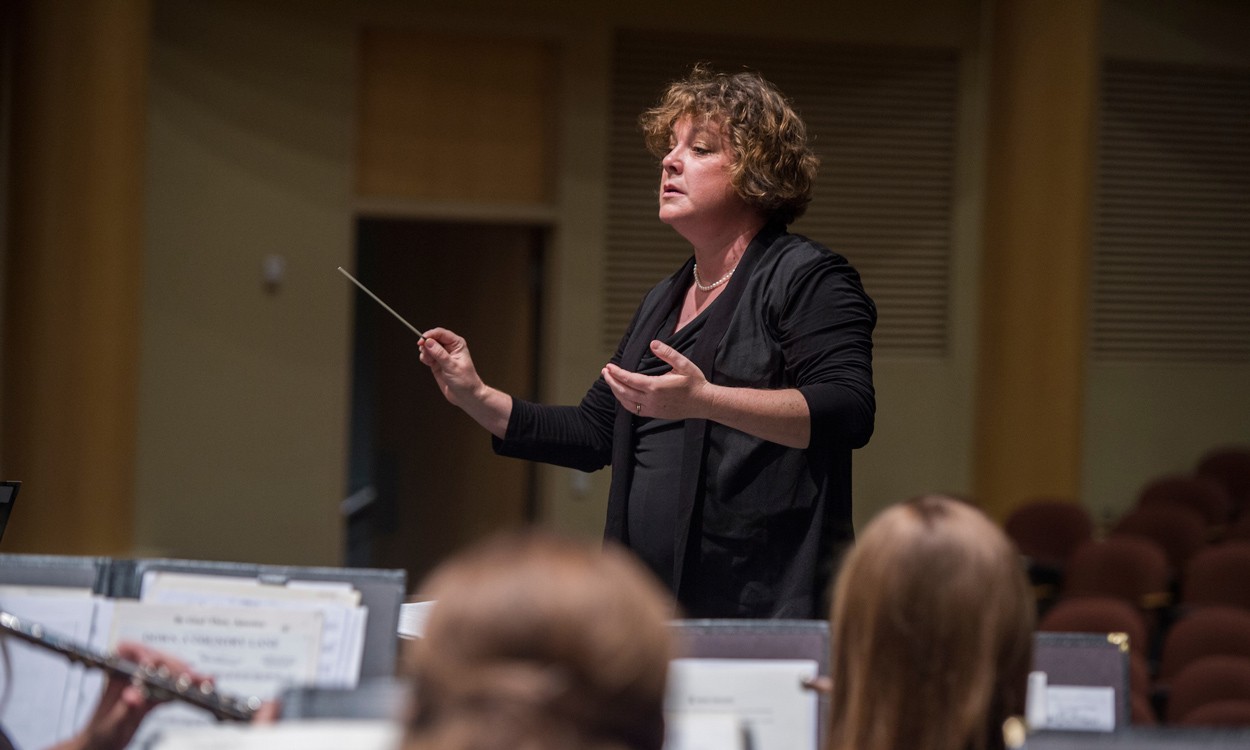Faculty members receive support from CFC, and each other, as they shift to online teaching

WCU associate professor Enrique Gomez gives an impromptu session for colleagues on how to record lectures online.
One of the many enjoyments Western Carolina University faculty members receive from teaching is the relationships and interactions they have with students.
It’s also one of the things they will miss most now that the university is switching to online classes beginning Monday, March 23, and likely remaining for the remainder of the spring semester because of the coronavirus pandemic. Faculty Senate chair Enrique Gomez said the news of switching to online teaching hit some faculty members hard.
“For a lot of faculty, our face-to-face interactions with our students are a very important part of our instruction and how we see ourselves as professional educators,” Gomez said. “If you have done online learning you are kind of used to this idea. But some faculty are being asked to teach in a modality that they’ve never even considered before, which came as a shock. One colleague shared with me that she cried for an hour after the email had been sent out from the chancellor.”
Online teaching has become a new reality for faculty members and is something which they have spent the last week preparing for. The Coulter Faculty Commons has played an instrumental role in providing faculty members with the necessary knowledge and tools to make this transition as smooth as possible.
Led by director Eli Collins-Brown, the CFC provided numerous virtual workshops for faculty members throughout the week, as well as fielding questions through its help desk. The workshops covered such things as how to use Zoom and the learning management system.
“We are all on board from our homes,” Collins-Brown said. “We’re sitting on email waiting for requests to come in. It’s been slow so far. My suspicion is faculty members are just trying to get their head wrapped around this new reality.”
In addition to the CFC’s efforts, Gomez and other faculty members have been proactive in helping prepare their colleagues. Gomez held an impromptu training session on how to use Panopto, a platform used to record lectures.
“Those faculty members who have had some experience with online learning have really stepped up to the plate in terms of sharing information with their colleagues on the mechanics of how to run a course online, sharing resources,” Gomez said. “Something else that’s happening, discipline by discipline, is informal networks have grown around social media that are sharing a tremendous amount of information and best practices to go online.”
One concern Gomez has noticed is the steep learning curve for some faculty members regarding technologies like Panopto and Zoom. In addition, there are some faculty members who are looking to do lectures live through Zoom at the same time their face-to-face classes were originally scheduled.
Collins-Brown is strongly urging faculty not to do so because students who have returned to their homes will have different times of availability because of other responsibilities such as taking care of siblings or other family members, or competing with others in the household for broadband access at that time.
“That is not best practice,” Collins-Brown said. “We are encouraging faculty to do a mixed type of facilitation, to put as much content and self-paced activities, tests and quizzes, all online and only reserve the synchronous webinars through Collaborate or Zoom for things like office hours or tutorial sessions.
“If they tried to teach synchronously, that’s not going to be a satisfactory experience for them as an instructor, and definitely not for students who are in a much different situation. If they’re trying to access the lms from a cell phone with three bars or two bars, that’s not going to be a good experience for them at all.”
Gomez said he calculated that during the 2018-19 academic year at WCU, students downloaded upwards of 28,000 hours of video content. He then calculated what it would be like if WCU provided only lectures online for an entire semester to about 12,000 students, that they would have to download roughly 1.5 million hours of video streaming content. “That tells you the magnitude of the job that’s happening,” he said.
It is still undetermined what will happen with programs like nursing where clinicals are a part of their accreditation agreement. Gomez, an associate professor, said in the Department of Chemistry and Physics there is a level of content already online of labs that can be simulated so students can carry out experiments on their own. He also said that some chemistry courses with labs have decided to have a recorded video and have students answer questions about the process.
The key to getting through this new normal is patience, understanding and adaptability, Gomez said.
“It’s a massive experiment that we are running right now,” Gomez said. “I think that we are hearing a call to be caring and compassionate, understanding and adaptable to students’ needs, as well as our own, and our colleagues. The call has been to have flexibility and to stay away from rigidity, stay away from things that are needless in terms of making the content and the teaching available to students.
“The thing is at this moment is we do not know the full scope of what students’ needs are going to be. Essentially, we are flying blindly at this point. That’s where the appeal to flexibility and understanding will be. I am willing to adjust my teaching methods and make adjustments as they need me to, and to ease up on deadlines and just being caring and understanding and supportive.”
As for those faculty members still needing help, they can call the help desk at 828-227-7487, email ithelp@wcu.edu or visit the website at https://www.wcu.edu/learn/faculty/coulter-faculty-commons/index.aspx.
“The CFC is fully onboard and available as long as we need to be,” Collins-Brown said. “We’re working full-time; we’re just all at home. We’re going to be available for faculty throughout the rest of the semester.”

